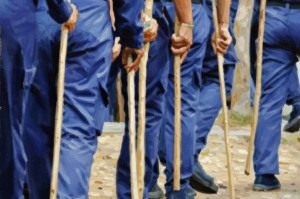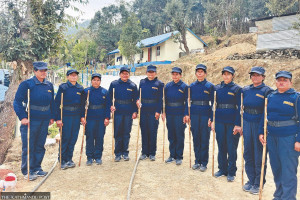Sudurpaschim Province
Shuklaphanta National Park constructs wall to prevent human-animal conflicts
Wild animals from the national park frequently enter human settlements in the park buffer zone and destroy crops, even taking lives.
Bhawani Bhatta
The Shuklaphanta National Park has built a wall that stretches from Majhgaun, the entry point of the park, to Rana Tharu Homestay in Bhimdatta Municipality to prevent human-animal conflicts.
The park spent Rs 25 million for the construction of the reinforced cement concrete wall, which is 8 metres tall and 1,000 metres long, the construction work of which began in the fiscal year 2017-18.
“We will study the effectiveness of the wall and extend its reach in the near future,” said Laxman Prasad Paudyal, chief conservation officer at the park. According to Paudel, the park plans to construct walls in areas where human-wildlife conflict is frequent.
Pushkar Bahadur Singh, former chairman of the Suklaphanta National Park Buffer Zone Management Committee, said that the wall will bar wild animals, including elephants, from entering human settlements. Wild animals have plagued the residents of Bhimdatta Municipality, Suklaphanta Municipality and Beldandi Rural Municipality for a long time now.
According to data from the national park, three people were killed in separate elephant attacks in the last three years.
“Every year, elephants enter our settlement and destroy our houses and crops. We hope that the construction of the wall will solve our problems,” said Singh.
In order to alleviate human-elephant conflicts in the area, park authorities, in coordination with the Department of National Parks and Wildlife Conservation, the local government and the provincial government, has been constructing concrete walls, electric fences and other infrastructures.
According to the Suklaphanta National Park Buffer Zone Management Committee, a 7km wire fence has been constructed from Jholunge Pul to Homestay area. “The consumer's committee, park office, Department of National Parks and Wildlife Conservation, and various organisations helped construct the fence at a cost of around Rs 10 million,” said Singh.
Kumbhakaran Rana, a local from Parkhedi, said that since the fence was put up, instances of wild animals entering their settlements have decreased. “Now, our vegetables and crops are safe from elephants,” he said.




 9.83°C Kathmandu
9.83°C Kathmandu















